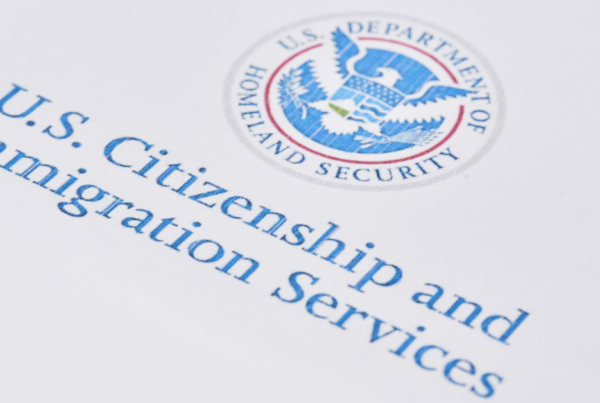
Today we’re taking a look at the Immigration lawyer best glossary for immigration terms. These terms may come into your life through the immigration process or as a result of an immigration case against you or a loved one, However you run into them, you need to be familiar with their meanings.
Immigration Lawyer: Best Glossary of Immigration Terms
Whether you’re facing a legal immigration case or are a newcomer to the U.S., it’s always helpful to familiarize yourself with immigration terms. Today we’re sharing some of the more important terms that you should know.
A-Number
When you are a non-citizen living in the U.S. you are assigned an “A-number”. This is also referred to as a USCIS number, an alien registration number, or an alien number and it is used to identify you by the U.S. Department of Homeland Security. If you become a permanent resident, your A-number will be printed on your Green Card.
Adjustment of Status
Adjustment of status refers to the process of applying for permanent residency in the U.S. (applying for a green card) while you are living in the U.S. If granted, an adjustment of status will allow you to obtain a Green Card and live in the U.S. as a permanent resident without having to return to your home country for your Visa to be processed.
This is the process that you can use to apply for lawful permanent resident status (also known as applying for a Green Card) when you are present in the United States. This means that you may get a Green Card without having to return to your home country to complete visa processing.
Biometrics
As an immigrant legally residing in the U.S. it is necessary for the government to have your biometrics on file. Biometrics is a word used to refer to physical traits that can be used to identify you – for example your fingerprints and your ears. When you go to a biometrics appointment, you can expect to have your fingerprints taken, your photograph taken, and you will also be asked for your signature.
Board of Immigration Appeals
If your immigration case has already been decided by a judge, the Executive Office for Immigration Review is permitted to review the decision made on your case by that judge. The office may also review decisions made by Department of Homeland Security Officers in some cases.
Carrier Documentation
This term refers to documentation that lets transportation carriers (for example, airlines) to board permanent residents of the U.S. who have traveled outside the country temporarily but whose re-entry permit or Green Card has been destroyed, stolen, or lost.
Continuous Residence
Continuous residence refers to the length of time that you have had a permanent home while you have been in the United States as a lawful permanent resident.
Defensive Asylum Application
A defensive asylum application is an application that is filed with an immigration judge when you are facing removal proceedings in immigration court. The application will defend against your removal from the country.
Deportable Alien
A deportable alien is someone who has been admitted to the United States as an alien but who is subject to removal based on terms outlined by the Immigration and Nationality Act. A deportable alien may be someone who entered the country legally but who violated the terms of their classification or status while in the U.S. or it can refer to an immigrant who entered the country illegally.
Deportation
Deportation refers to the removal of an immigrant from the United States when they have violated immigration laws and have been deemed removable as a result of their actions. Deportation is ordered by an immigration judge and does not involve the judge issuing punishment for the violation committed. Deportation is now referred to as “removal” and it is managed by U.S. Immigration and Customs Enforcement.
Derivative Citizenship
Derivative citizenship refers to citizenship that is automatically given to children as a result of their parents being naturalized OR in some instances when a foreign-born national is adopted by U.S. citizen parents (but only if certain requirements are met).
Employer Sanctions
Employer sanctions are criminal penalties or civil fines that are imposed on employers who violate regulations that apply to the recruitment, hiring or, or referral for money of immigrants who are known to be ineligible to work in the U.S. or if they continue to employ immigrants after finding out that they are unauthorized, or hiring an immigrant without filing an I-9 form.
Foreign National
A foreign national is anyone who does not have U.S. citizenship or nationality.
Green Card
A Green Card is also referred to as an alien registration card, permanent resident card, and a Form I-551. This card is issued by the USCIS to immigrants living in the U.S. with legal permanent resident status. Green cards issued to individuals with conditional permanent resident status are only valid for two years. Green cards issued to other immigrants with permanent resident status are valid for 10-years. In some instances, a Green Card may not have an expiration date.
It’s important to pay attention to the expiration date on your Green Card if you have one. You MUST renew your card or apply for a change of status before the expiration date on your card.
Immigration Act of 1990
The Immigration Act of 1990 is the Public Law 101-649 that increased the limits placed on legal immigration to the United States, revised the grounds for deportation and exclusion, authorized temporary status to aliens of designated countries, established and revised new non-immigrant admission categories, revised and extended the Visa Waiver Pilot Program, and revised naturalization authority and requirements.
Immigration Lawyer: Best in Class
If you’re in or around the Pasadena, California area and you’re looking for a reputable and experienced immigration lawyer who can help with your case, call Nelson Immigration today at 626-683-3451.



